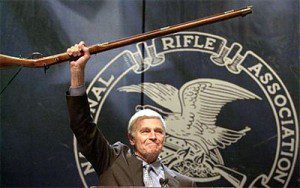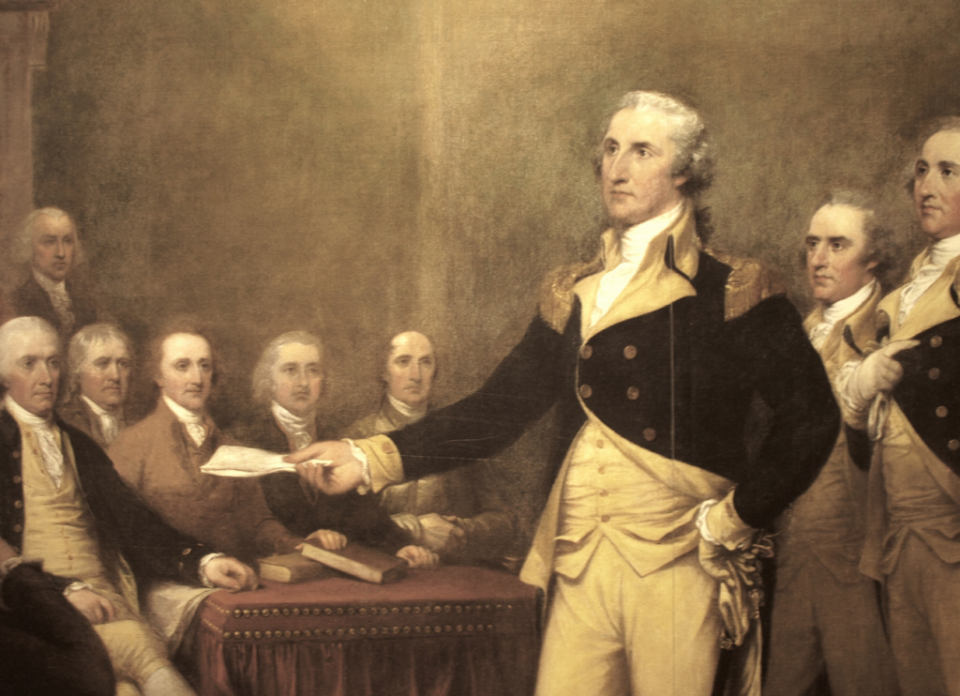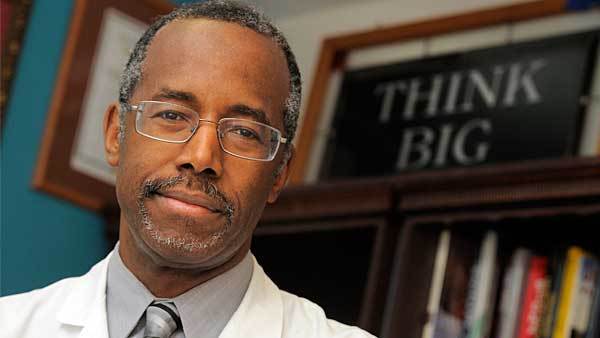Charlton Heston – From My Cold Dead Hands
Charlton Heston’s chillingly prophetic speech – From My Cold Dead Hands
Charlton Heston, the former actor and president of the National Rifle Association, gave a prophetic speech in 2000 in defense of the Second Amendment. He ended that speech with his now famous phrase, “From my cold dead hands!”
Truer words could not be spoken any clearer!
During the height of the 2000 election season, Heston delivered a rousing speech at the NRA Convention in which he closed by invoking an old Second Amendment battle cry as he raised a vintage 1874 buffalo rifle over his head: “So, as we set out this year to defeat the divisive forces that would take freedom away, I want to say those fighting words for everyone within the sound of my voice to hear and to heed, and especially for you, (presidential candidate) Mr. (Al) Gore: ‘From my cold, dead hands.’”
The “cold, dead hands” saying did not originate with Heston. It had been around since the 1970s, when it was used as a slogan for literature and bumper stickers by gun rights activists. The slogan didn’t even originate with the NRA; it was first used by the Washington-based Citizens Committee for the Right to Keep and Bear Arms.
But Heston’s usage of those five words in 2000 made them iconic. Gun owners across the nation began using the slogan as a rallying cry, saying, “You can have my guns when you take them from my cold, dead hands.” Heston is often incorrectly attributed with coining the phrase. When he resigned from the NRA presidency in 2003 due to his declining health, he again raised the rifle over his head and repeated, “From my cold, dead hands.”
Sarah Palin – I Do Not Like This Uncle Sam
Sarah Palin, insprired by Ted Cruz who read “Green Eggs and Ham” during his filibuster last year, rewrote the Dr. Seuss classic during her brilliant speech at CPAC 2014.
Sarah Palin – I Do Not Like This Uncle Sam
“I do not like this Uncle Sam.
I do not like his health care scam.
I do not like — oh, just you wait —
I do not like these dirty crooks,
or how they lie and cook the books.
I do not like when Congress steals,
I do not like their crony deals.
I do not like this spying, man,
I do not like, ‘Oh, Yes we can.’
I do not like this spending spree,
we’re smart, we know there’s nothing free.
I do not like reporters’ smug replies
when I complain about their lies.
I do not like this kind of hope,
and we won’t take it,
nope, nope, nope
via Gateway Pundit
Previously:
Dr. Seuss: I Do Not Like This Uncle Sam
George Washington’s First State Of The Union Address
Article II, Section 3 of the U.S. Constitution requires the President of the United States to …
“…from time to time give to the Congress Information of the State of the Union, and recommend to their consideration such Measures as he shall judge necessary and expedient;…”
While the Constitution specifies no time, date, place, or frequency for the Address, President’s have typically delivered the State of the Union in late January, soon after Congress has re-convened. This timing allows the President to spell out the Administration’s agenda for the coming year and to “… recommend to their consideration such Measures as he shall judge necessary and expedient;…” before Congress has taken up any major legislation.
On January 8, 1790, President George Washington complied with Article II, Section 3. (Spellings appear as in the original draft.)
State of the Union
George Washington
January 8, 1790
Federal Hall, New York City
Fellow Citizens of the Senate and House of Representatives:
I embrace with great satisfaction the opportunity which now presents itself of congratulating you on the present favorable prospects of our public affairs. The recent accession of the important state of north Carolina to the Constitution of the United States (of which official information has been received), the rising credit and respectability of our country, the general and increasing good will toward the government of the Union, and the concord, peace, and plenty with which we are blessed are circumstances auspicious in an eminent degree to our national prosperity.
In resuming your consultations for the general good you can not but derive encouragement from the reflection that the measures of the last session have been as satisfactory to your constituents as the novelty and difficulty of the work allowed you to hope. Still further to realize their expectations and to secure the blessings which a gracious Providence has placed within our reach will in the course of the present important session call for the cool and deliberate exertion of your patriotism, firmness, and wisdom.
Among the many interesting objects which will engage your attention that of providing for the common defense will merit particular regard. To be prepared for war is on e of the most effectual means of preserving peace.
A free people ought not only to be armed, but disciplined; to which end a uniform and well-digested plan is requisite; and their safety and interest require that they should promote such manufactories as tend to render them independent of others for essential, particularly military, supplies.
The proper establishment of the troops which may be deemed indispensable will be entitled to mature consideration. In the arrangements which may be made respecting it it will be of importance to conciliate the comfortable support of the officers and soldiers with a due regard to economy.
There was reason to hope that the pacific measures adopted with regard to certain hostile tribes of Indians would have relieved the inhabitants of our southern and western frontiers from their depredations, but you will perceive from the information contained in the papers which I shall direct to be laid before you (comprehending a communication from the Commonwealth of Virginia) that we ought to be prepared to afford protection to those parts of the Union, and, if necessary, to punish aggressors.
The interests of the United States require that our intercourse with other nations should be facilitated by such provisions as will enable me to fulfill my duty in that respect in the manner which circumstances may render most conducive to the public good, and to this end that the compensation to be made to the persons who may be employed should, according to the nature of their appointments, be defined by law, and a competent fund designated for defraying the expenses incident to the conduct of foreign affairs.
Various considerations also render it expedient that the terms on which foreigners may be admitted to the rights of citizens should be speedily ascertained by a uniform rule of naturalization.
Uniformity in the currency, weights, and measures of the United States is an object of great importance, and will, I am persuaded, be duly attended to.
The advancement of agriculture, commerce, and manufactures by all proper means will not, I trust, need recommendation; but I can not forbear intimating to you the expediency of giving effectual encouragement as well to the introduction of new and useful inventions from abroad as to the exertions of skill and genius in producing them at home, and of facilitating the intercourse between the distant parts of our country by a due attention to the post-office and post-roads.
Nor am I less persuaded that you will agree with me in opinion that there is nothing which can better deserve your patronage than the promotion of science and literature. Knowledge is in every country the surest basis of public happiness. In one in which the measures of government receive their impressions so immediately from the sense of the community as in ours it is proportionably essential.
To the security of a free constitution it contributes in various ways – by convincing those who are intrusted with the public administration that every valuable end of government is best answered by the enlightened confidence of the people, and by teaching the people themselves to know and to value their own rights; to discern and provide against invasions of them; to distinguish between oppression and the necessary exercise of lawful authority; between burthens proceeding from a disregard to their convenience and those resulting from the inevitable exigencies of society; to discriminate the spirit of liberty from that of licentiousness – cherishing the first, avoiding the last – and uniting a speedy but temperate vigilance against encroachments, with an inviolable respect to the laws.
Whether this desirable object will be best promoted by affording aids to seminaries of learning already established, by the institution of a national university, or by any other expedients will be well worthy of a place in the deliberations of the legislature.
Gentlemen of the House of Representatives:
I saw with peculiar pleasure at the close of the last session the resolution entered into by you expressive of your opinion that an adequate provision for the support of the public credit is a matter of high importance to the national honor and prosperity. In this sentiment I entirely concur; and to a perfect confidence in your best endeavors to devise such a provision as will be truly with the end I add an equal reliance on the cheerful cooperation of the other branch of the legislature.
It would be superfluous to specify inducements to a measure in which the character and interests of the United States are so obviously so deeply concerned, and which has received so explicit a sanction from your declaration.
Gentlemen of the Senate and House of Representatives:
I have directed the proper officers to lay before you, respectively, such papers and estimates as regard the affairs particularly recommended to your consideration, and necessary to convey to you that information of the state of the Union which it is my duty to afford.
The welfare of our country is the great object to which our cares and efforts ought to be directed, and I shall derive great satisfaction from a cooperation with you in the pleasing though arduous task of insuring to our fellow citizens the blessings which they have a right to expect from a free, efficient, and equal government.
Ben Carson Targeted By The IRS After National Prayer Breakfast Speech
It shouldn’t be much of a surprise to anyone paying attention, but it’s still shocking to hear stories like this. Are we expected to chalk it up to coincidence?
Watch out patriots. We are next!
Apparently the Thug-in-Chief sent his boys over to try to rough Ben Carson up a little after his famous National Prayer Breakfast speech earlier this year:
DAILY CALLER – At an event in Birmingham, Ala. Monday night, former Johns Hopkins neurosurgeon Ben Carson revealed that he had received a visit from the Internal Revenue Service following his much-noted remarks at a National Prayer Breakfast earlier this year.
“I had my first encounter with the IRS this year, unsurprisingly after the prayer breakfast,” Carson told an audience that at the annual Business Council of Alabama Chairman’s Dinner, according to a report from Cliff Sims of the Montgomery, Ala.-based Yellowhammer News.
The thuggery never ends with this president. Never.



